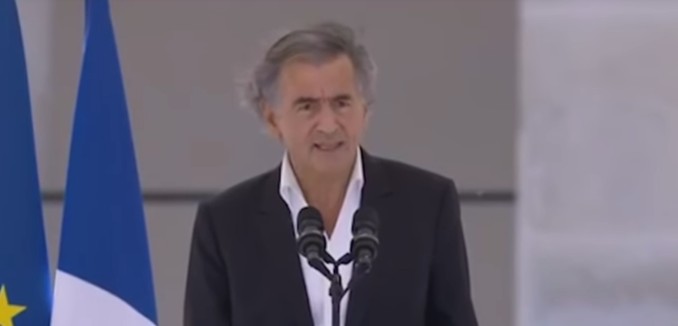The disturbing rise of anti-Semitism around the world highlights the need for “resistance and counteroffensive” from within the Jewish community in both the United States and Europe, prominent French-Jewish writer and public intellectual Bernard-Henri Lévy said in an exclusive interview with the Algemeiner’s Ben Cohen this week.
Lévy, the son of Algerian immigrants to France, warned that hatred against Jews has reached a magnitude never experienced before by the majority of Jews alive today.
“Antisemitism is back. Everywhere. Openly,” Lévy observed, referencing events of last year that saw Jews massacred at a synagogue in Pittsburgh in October, and an 85-year-old Holocaust survivor, Mireille Knoll, brutally stabbed to death by two assailants in Paris in March.
“Times are tough again for the Jews,” he continued. “The need for resistance and counteroffensive has returned for the Jews of Europe, the United States, and the world. It’s terrible. But that’s the way it is. And it is a fact that we’re going to have to start dealing with right now.”
When asked to compare the nature of anti-Semitism in Europe with that in the U.S., Lévy answered that the “two things are not comparable, fortunately. Antisemitism is much weaker in the United States than in Europe.” But, he went on, warning “what’s new is that it’s also present in the United States, which means that there is no longer a safe haven in the West.”
The French philosopher went on to explained why civic education and Holocaust remembrance are not enough to contain the spread of virulent anti-Semitism. “There is no correlation between education and wisdom. You can teach remembrance of the Holocaust all you want — but that’s not going to protect us against the return of the Beast.”
A better strategy, Lévy asserted, lay in “an accurate analysis of antisemitism — its nature, its sources, and the way it operates. There are so many clichés on that score, so much conventional thinking. These have to be deconstructed.”
Levy, a critic of U.S. President Donald Trump, said that given the hostile climate Jews face around the world, the Israeli government’s positive view of the U.S. leader was understandable. He warned however, that “Gestures of friendship are fine, but what are they worth if they are not grounded in a deep, basic friendship that comes from the heart.”
He continued: “Defending Israel at the United Nations is obviously important. But what if that defense is not based on a true Ahavat Israel (love of Israel)? That is the question.”
Levy specifically criticized the foreign policy of the Trump administration, which he charged contradicts the rhetoric coming from the White House.
“You can’t say ‘Iran is our enemy,’ and then authorize specific countries and companies to purchase its oil. Nor can you pretend that you want to overturn the Iranian regime while simultaneously abandoning the Kurds, who are our true allies in that battle, our real boots on the ground against renascent Persian imperialism.”
Alas, he continued, “that is precisely what the West is doing,” citing the decision to withdraw U.S. troops from Syria, despite concerns from critics that it could strengthen Iran and weaken Kurdish allies.
On the viability of regime change in Iran, Lévy said that “at the risk of disappointing my compatriots, I continue to believe it’s possible.
“I am a man of the left, a liberal,” he said. “But on this point — on the possibility and the necessity of provoking changes of regime — the American neoconservatives are right. We have to have the courage to acknowledge this.”
In an essay published in the February 2017 issue of The Tower Magazine, Anti-Semitism’s New Guise, Israel’s Exceptional Future, which was adapted from his book The Genius of Judaism, Levy wrote:
The fact remains that anti-Semitism exists.
Some had thought it dead, obsolete, cast aside.Wrong.
It is back.
Making new connections.
It has even begun to strike and to kill—to growing indifference—in French cities.
And, moreover, because observers of the phenomenon often seem blind to its new reality and, believing that they are confronting it, grapple only with its shadows, I see no option but to begin by describing the new guise of the oldest form of hate.
[Photo: Le Huffington Post / YouTube ]




